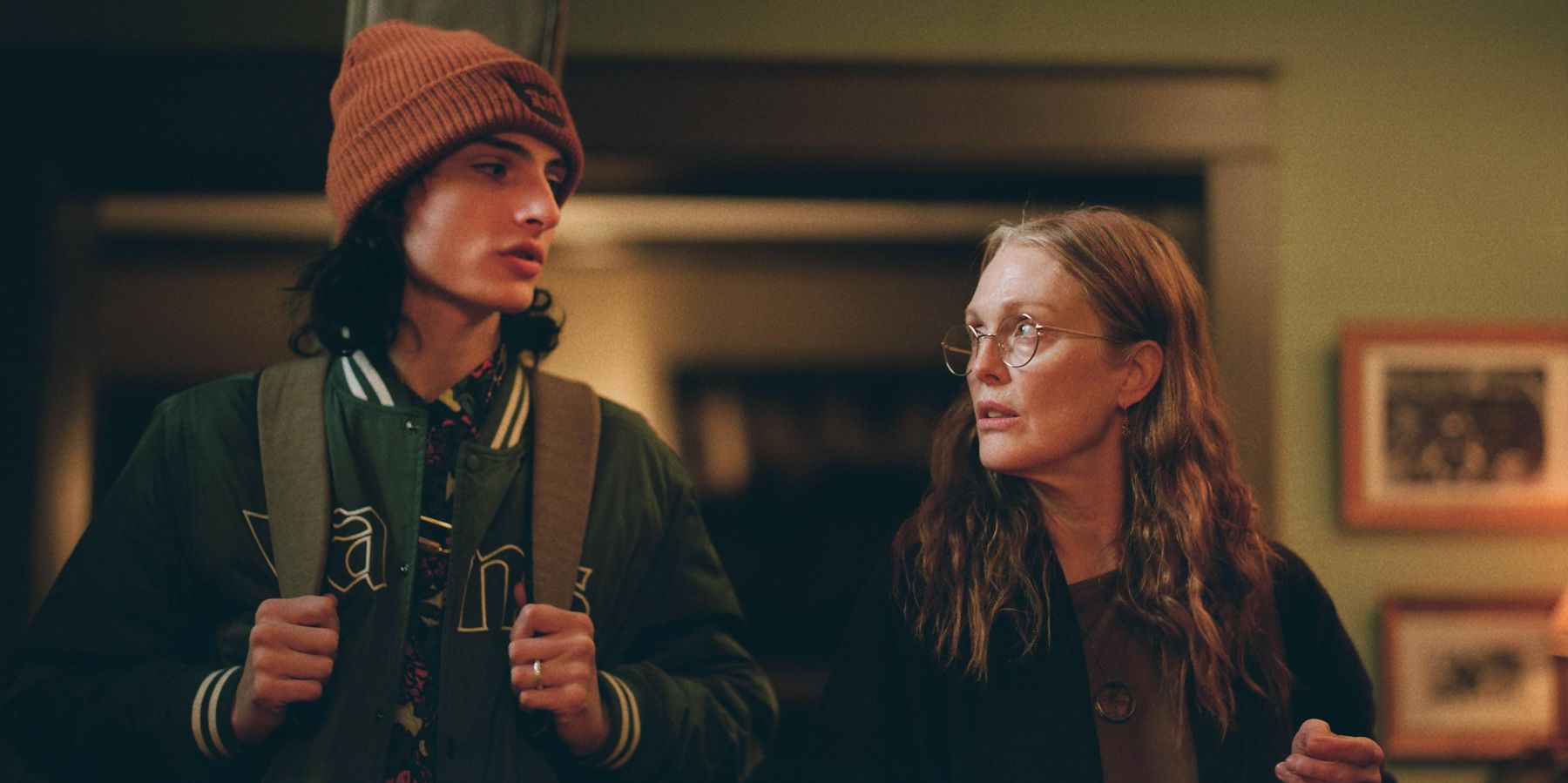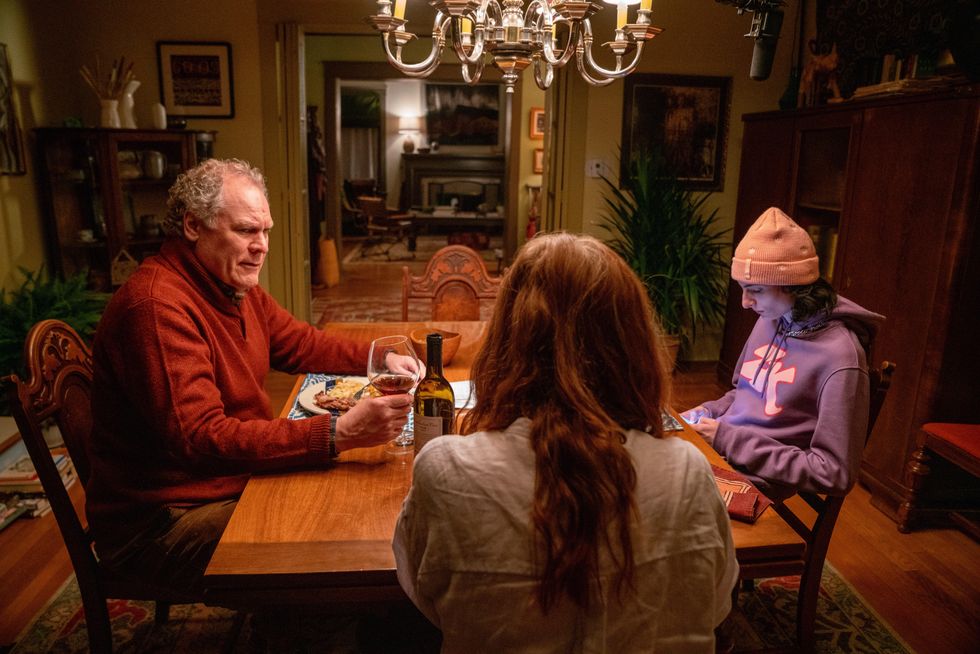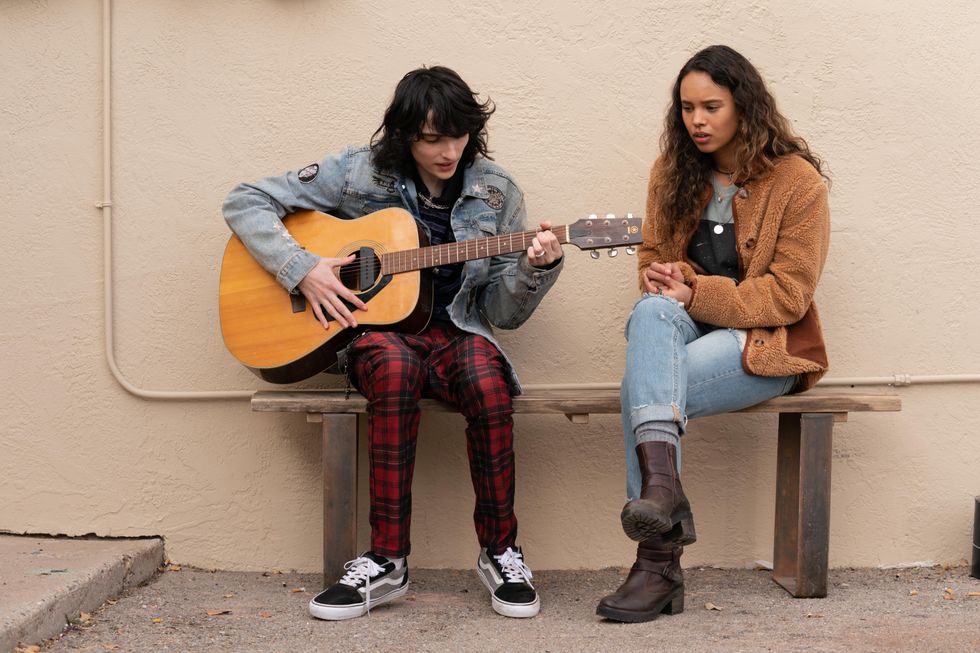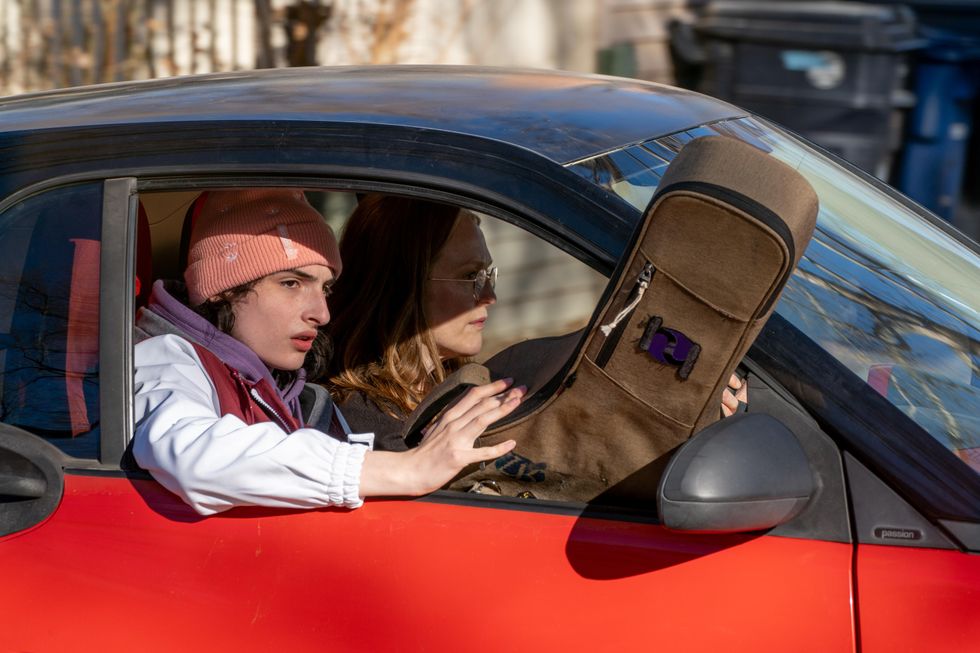
Twenty-year-old actor Finn Wolfhard Zooms into our call from NYC's swanky Park Lane Hotel, wearing a vaguely iridescent purple button-down that shines as he thoughtfully reminisces on the complicated journey of playing the corny and egocentric character Ziggy Katz in When You Finish Saving The World. The film is actor-turned-writer-director Jesse Eisenberg’s directorial debut, hitting select theaters on January 20.
The indie coming-of-age tale is clever and flippant, exploring the boundaries of lived and idealized politics through satirical, self-mocking characters whose blinding narcissism repels those closest to them. Wolfhard plays the delusional folk-rock music influencer, opposite Julianne Moore, his do-gooder mother, Evelyn, an NPR-and-Chopin-listening counselor who runs the local women’s shelter.
The project began in 2020 as an audiobook, which was then expanded into a shrewdly understated feature script, with Wolfhard reprising his Audible role on screen. Produced by Emma Stone and Dave McCary, the film made its first splash at the Sundance Film Festival last year.
Eisenberg’s signature dry wit and allegorical mini-scenes take the blundering characters on misguided misadventures, often ending in cringe-worthy scuffles. “I’m going to be rich and you’re going to be poor,” Ziggy shouts at his mother. Self-absorbed and deluded, Ziggy struggles to pick up on his peers' cues (or really anything happening in the world around him). In stark contrast, Wolfhard offers kind and articulate insights into the project, where he gave a stand-out performance — perhaps solidifying his career and proving his talents can translate to complex and character-driven roles.
This will no doubt be a career-defining year for Wolfhard. Besides starring in this film, Wolfhard hopes to witness the release of his pet project (co-directed and co-written with WYFSTW co-star Billy Bryk), he continues to write and perform music with his band The Aubreys and he's gearing up to shoot the final season of Stranger Things.
In a conversation with PAPER, Wolfhard shares what it was like playing the infuriating Ziggy and expands upon what happens after the climactic and ambiguous final scene of the film. Read our interview with the actor below.

Photo by Karen Kuehn
Ziggy is a really compelling portrayal of the chronically online, teenaged demographic. Where did you draw inspiration for this role?
You'd be surprised how many kids my age are like this and have this skewed idea of who they are because of how powerful social media can seem when you're on it, but then when you're in your real life, it actually doesn't really mean anything.
Do you relate with Ziggy at all? Are there aspects of his character you find in yourself?
Definitely. I relate to his need to perform and find human connection. I find him to be a very funny character. I also have pity for him. I feel sad for him. I'm sort of laughing with him. But also, I want to kill him. I want to slap him in the face. And I've been trying to strike a balance between someone that you might hate but also someone you feel pity for.
I also found him really likable at times. He's charismatic and self-assured. I know music is also really important to you in your off-camera life. How was it to play a character that shared your love for music?
I was so pleasantly surprised that Jesse Eisenberg and Emile Mosseri, the composer, let me run wild with some of the songs. Jesse wrote the lyrics. Emile wrote the music. And at least for the song "Pieces of Gold," which starts and ends the movie, they just gave me the project file and were like, Alright, sing over it and add whatever instruments you want. It was so cool to be able to improvise a few songs in the film and write the music to one of the songs.
That sounds so fun.
It was so fun. For [Eisenberg and Mosseri], it added a level of authenticity to the role because I was making music in character. It made me feel more comfortable playing the character, too, because music has always been something that I do for myself. l can just escape to it. And Ziggy feels the same way.

Photo by Karen Kuehn
You have a long history as Mike Wheeler from Stranger Things. How was the transition from your character Mike, who cares so deeply about his friends and the people around him, to Ziggy, who, at times, really struggles to see outside of himself?
Yeah, and he can't seem to care for anyone but himself. I cared about Ziggy almost as much as Mike cares about his friends. Someone who's loyal to themself to a fault. And the reason why he's so self-absorbed and obnoxious is that he doesn't really know how not to be. He's been in a house where he's not been supported in what he's been doing. All he wants is his mom to respect what he does. And it makes him so mad that she doesn't.
And on top of that, he has this skewed view of himself, because on the internet, he's so loved, but then in real life, no one really cares about him. And so that comes out as a defense and an arrogance, because, in his mind, if no one's gonna be his champion, I guess he has to be. He actually is capable of caring for people, he just has a really weird way of going about it and at times doesn't know how. By the end of the film, he realizes that the world is bigger than him and that his mom actually does something really amazing.
I was just going to ask you about what happens after the cameras stop rolling. There are a lot of conversations about wanting to be political versus actually doing the work to be political. And then there's this open-ended final scene. Does Ziggy end up doing "the work?" Should he do the work?
By nature, Ziggy isn't very political. He likes making songs. He likes making money and being a capitalist. And his mother Evelyn has been trying to make him someone that he's not for years. But his mother realizes that he can't be who she wants him to be and that he actually does something pretty cool.
He wants to be [political like his mother] deep down, but maybe that's just not who he is. But he can try. By the end of the film, he actually has more respect for his mother and social justice than he thought. And it gets him to think about what amazing things his mother has done. To me, after the cameras cut, there's the meet-in-the-middle thing where they both realize that they have been misguided and wrong for so long. It's a really beautiful end to a really self-centered movie.
Are there any larger takeaways you had from working on this movie and existing in this world for so long where politics and identity are really at odds with each other? What did you learn from these characters?
It's given me more empathy toward people. Anyone, including myself, that has said something selfish, or acted selfish, or done something wrong, or was arrogant or whatever: I've found more empathy [for them]. It's given me more humanity and more than anything has made me sad for people that are so lost.

Photo by Karen Kuehn
What was your favorite part about working on this project?
I loved the crew so much, every single one of them. And working with Jesse as a director, he really got me as a person and as a performer. That made me feel really good. Jesse really humanizes being an actor. There's a lot of people that like to have acting be some mysterious thing and Jesse's just like, "Listen, we're all really scared and neurotic idiots and we're just trying to make stuff that we identify with and teaches us something about ourselves and other people."
Also, acting with Julianne Moore every day and getting to act with one of the best people and best living actors was just the best. She really let me try stuff and vice versa. We had so much fun. My favorite scene to film was the scene where we're screaming at each other in the kitchen. I just remember thinking, This is so fun.
You got to let loose a little bit.
Exactly! We were really working some stuff out.
Do you have any projects coming up? What’s next for you this year?
Well, I directed a film. It's called Hell of a Summer. I co-wrote and co-directed it with Billy Bryk, who plays Kyle in When You Finish Saving The World.
That's incredible. Congratulations!
Thank you so much. So hopefully that comes out this year. And then I get to shoot the last season of Stranger Things which I'm really excited about. I haven't read anything yet, but I'm so excited.
Is that like going back to camp?
Basically! Yeah, it does really feel like that. Next is the last season so I guess that's like the graduation.
Photo by Beth Garrabrant
From Your Site Articles
- Finn Wolfhard Is the Fresh New Face of Saint Laurent ›
- Millie Bobby Brown Says Finn Wolfhard is a Lousy Kisser ›
Related Articles Around the Web